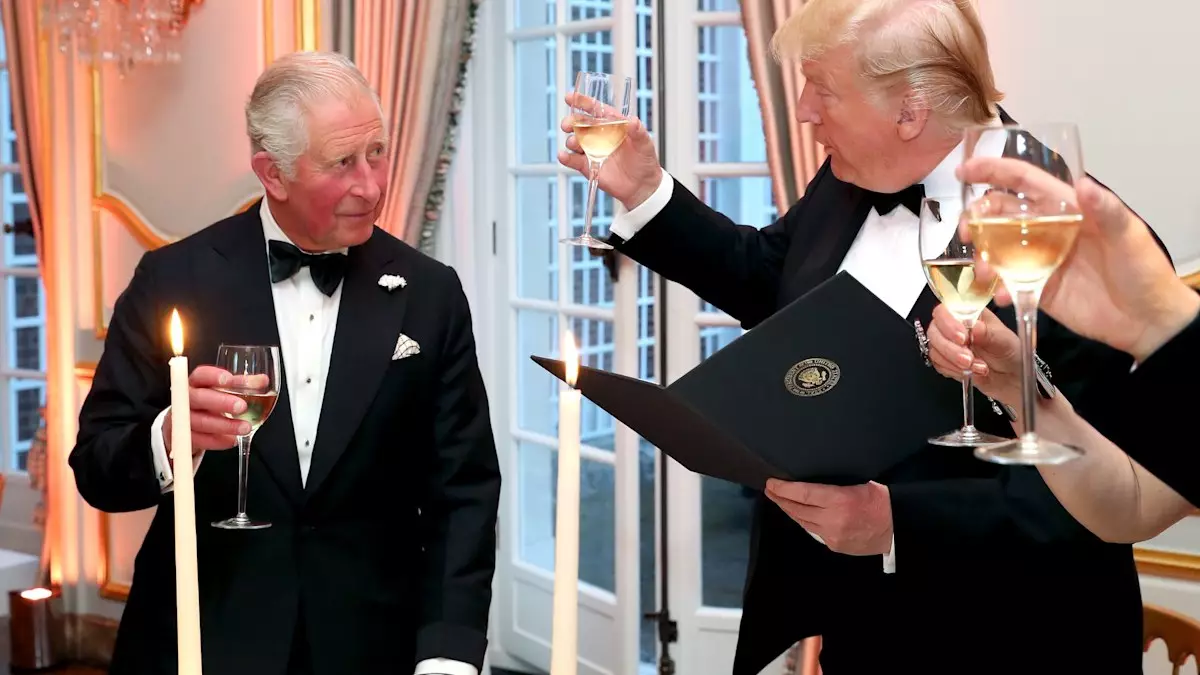In a surprising revelation that signals the evolving dynamics of international diplomacy, former President Donald Trump has seemingly confirmed his impending second state visit to Buckingham Palace, scheduled for September 2025. This announcement marks a significant milestone, illustrating not only Trump’s unique standing in diplomatic circles but also the broader implications for US-UK relations. Traditionally, second state visits are not extended to presidents serving non-consecutive terms, making this occasion historic in its rarity.
Trump shared his sentiments with reporters in the Oval Office, expressing genuine affection for the United Kingdom and its royal family. He described the forthcoming visit as a “fest,” infused with a sense of pride and honor. Trump’s warm words about King Charles III reflect a personal connection that transcends mere political alliances. It is evident that Trump’s charm and idiosyncratic diplomacy resonate well with the British monarchy, signaling a somewhat unconventional yet powerful partnership that may redefine expectations for future state visits.
A Personal Relationship with the Royals
What adds an intriguing layer to this narrative is Trump’s self-proclaimed friendship with King Charles. Unlike many previous US administrations, which may have approached the monarchy with formal reserve, Trump appears to have embraced a more personal rapport. In an age where diplomatic ceremonies can often feel detached, this personal connection could breathe new life into traditional state relations. Trump’s admiration for the royal family, particularly King Charles and other senior royals, suggests a diplomatic strategy that hinges less on strict protocol and more on personal relationships.
The details of Trump’s forthcoming visit evoke memories of his first state visit in June 2019, which was notably lavish and media-saturated. During that visit, he and First Lady Melania Trump were honored with a state banquet at Buckingham Palace, attended by a veritable who’s who of the British aristocracy. Trump’s affinity for the royal family became apparent during that trip, and it appears he has maintained those cherished ties.
Keir Starmer’s Role in Reviving Diplomatic Traditions
British Prime Minister Keir Starmer’s role in extending this invitation reflects a strategic diplomatic maneuver in itself. Having met Trump in the Oval Office, Starmer described the invitation as “unprecedented,” emphasizing the strength of the unique relationship forged between the two leaders. A visit of this nature, particularly in a bipartisan context, hints at an effort to underline the importance of UK-US relations that extend beyond immediate political differences. This relationship, often characterized by camaraderie and shared values, is crucial in a world increasingly marked by geopolitical tensions.
Starmer’s invitation comes as part of an effort to solidify international alliances, offering Trump a platform that may help reconnect American leadership with traditional allies. In a time marked by shifting global alliances, transferral of honorific titles, and increasingly complex international relations, such visits can reinforce cooperation on matters imparting national interests, from economic collaboration to security.
The Resonance of Trump’s Return
Donald Trump’s acknowledgement of his “great respect” for King Charles and the royal family encapsulates a consciousness of legacy. For Trump, this visit may provide an opportunity to reaffirm his standing both domestically and internationally. It serves as a potent reminder of how personal diplomacy often trumps traditional norms. Trump’s ability to navigate these waters—balancing personal rapport with political strategy—could provide a unique framework for future diplomatic engagements.
Metaphorically, Trump’s upcoming visit feels like an anchor in a sea of uncertainty. As international relations become increasingly volatile, the strength of relationships like the one between the US and UK offers a reassuring constancy. Trump’s affection for the British royals and their historical significance may resonate not only within political circuits but also among the populace—especially considering the profound respect many hold for the monarchy.
In retrospect, this second state visit reflects more than just a diplomatic formality; it serves as a bridge connecting the complex histories of two great nations, underscoring the vitality of relationships forged on mutual respect and personal engagement. While the world observes with bated breath, one cannot help but wonder how this unprecedented visit will unfold, and what it will mean for US-UK relations moving forward.

